AI in VoIP refers to the use of artificial intelligence (AI) in voice-over-internet-protocol (VoIP) phone systems to deliver efficient and personalized business communications. The integration of these technologies introduces advanced features, such as intelligent call routing, advanced analytics, and voice-to-text transcription. Read on to learn how to leverage VoIP AI in your cloud communications strategy.
How AI in VoIP Works
In the context of VoIP technology, AI works by utilizing machine learning—an AI subset that enables computers to make accurate predictions by learning from data and experiences.
VoIP providers use machine learning to improve the overall quality of cloud communications. Machine learning looks for data patterns in customer interactions to make accurate predictions based on those patterns. For instance, an AI tool suggests initiating outreach calls during the peak hours of 4:00 to 5:00 p.m., as it has been observed that customers are more likely to engage during those periods.
With machine learning, AI-powered VoIP software improves its performance over time as it is continuously being fed with data. This provides the solution with advanced capabilities, including analyzing the caller’s tone, suppressing background noise during calls, and directing incoming calls to the right destination.
Machine learning works hand in hand with its language-based subset called natural language processing (NLP). The goal of NLP is to enable computers to understand, process, and analyze texts and human language in a meaningful manner.
When integrated into VoIP, NLP allows business phone systems to handle complex inquiries through virtual assistants and transcribe spoken language into text via live transcription. In the next section, we provide a more in-depth look at the role of machine learning and NLP in VoIP.
Key AI Features in VoIP
AI delivers a wide range of cutting-edge features to VoIP phone systems that enhance the efficiency and responsiveness of any business operation. But before investing in an AI VoIP platform, it’s important to consider which capabilities you need the most. Here are some notable AI features you need to watch out for:
IVR is an intelligent call routing system designed to streamline the process of transferring incoming calls within an organization. By incorporating AI, IVR systems expand their capabilities by providing human-like interactions and seamless self-service experiences. Self-service options include checking account balances, booking appointments, and making bill payments.
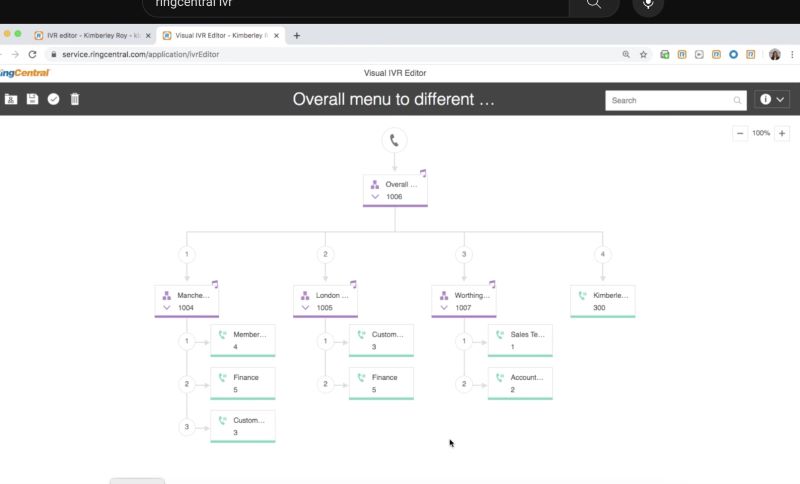
RingCentral provides a visual IVR editor for creating flexible IVR menus. (Source: RingCentral YouTube)
RingCentral utilizes speech recognition for its IVR to analyze a wide range of voice inputs and process that information to route calls to the right destination. Routing decisions are based on the system’s established rules and certain criteria, such as call history, priority level, and account status. Proper configuration of IVR enhances the overall customer experience by connecting callers to the right agent or department that can truly address their inquiries.
Noise cancellation, also referred to as noise reduction or active noise control, uses machine learning to selectively suppress background noise while allowing speech to come through. This feature specifically caters to VoIP users working outside traditional office settings where various factors can compromise the quality of calls.

RingCentral noise reduction feature comes with advanced background noise filtering. (Source: RingCentral)
RingCentral’s noise reduction feature uses audio signal processing algorithms to effectively filter out unwanted sounds, such as air conditioning hums, people talking, and doors shutting. If you’re in a noisy environment, activating this feature ensures your calls remain clear and sharp, creating a seamless call experience.
Traditionally, transcription happens after the call or when a voicemail message comes through. With artificial intelligence (AI), VoIP solutions can now transcribe calls into text as it’s happening and enhance the accessibility of phone systems.
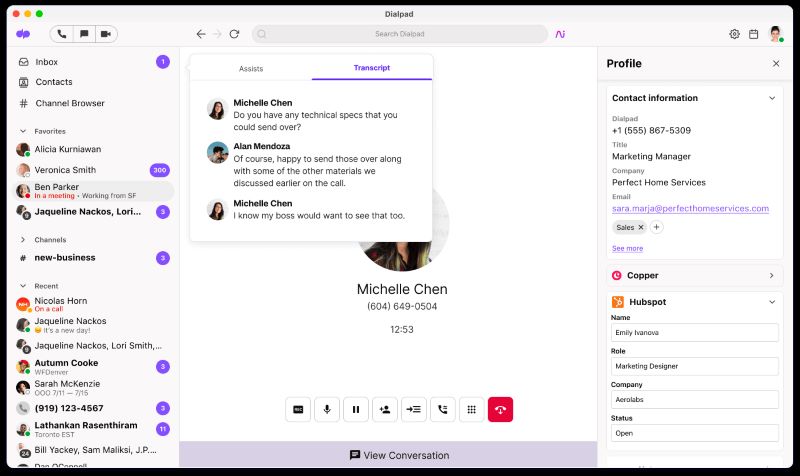
Dialpad transcribes calls and video meetings in real time as they’re happening. (Source: Dialpad)
Besides transcribing calls, VoIP AI providers like RingCentral and Dialpad can automate call summaries with searchable speech-to-text transcripts that include call highlights and action items. Real-time transcription is particularly useful for the hearing impaired, note-taking, and those who prefer or need to see the words to understand what has been said.
Virtual assistants can be in the form of an AI chatbot or voicebot that engages in natural, human-like conversations. Through natural language processing (NLP) and speech recognition, a virtual assistant learns from data and previous interactions to understand customer queries, allowing businesses to provide more efficient and personalized customer service.
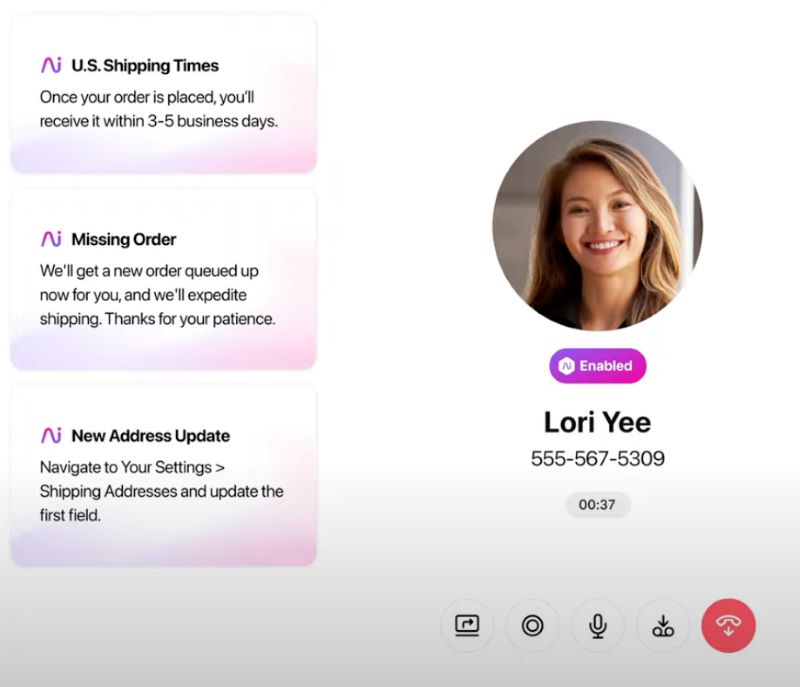
Dialpad Ai Agent Assist provides automated support scripts to guide agents during live calls. (Source: Dialpad)
Dialpad’s virtual assistant can perform a range of self-service support for customers—translating live calls, providing accurate responses, verifying data, and scheduling appointments. This brings more tailored experiences for customers as well as shorter wait times and faster problem resolution.
AI VoIP systems take a deeper dive into customer interactions by analyzing the caller’s emotional state. Whether it’s a written text or spoken word, sentiment analysis can detect whether the customer feels happy, sad, angry, or neutral during the call.
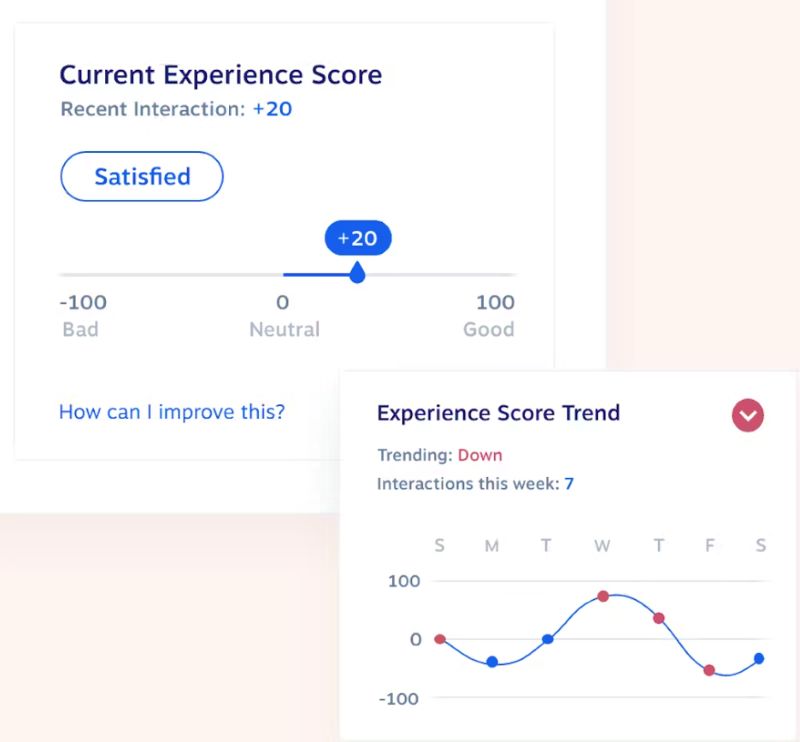
Nextiva uses natural language processing to analyze conversations automatically and detect the needs of the customer. (Source: Nextiva)
VoIP providers like Nextiva use an algorithm to evaluate the words, tone, and intonation to identify a call’s underlying sentiment. This efficiently reduces the time and effort spent manually reviewing every call recording. In turn, businesses are able to gauge the customer’s level of satisfaction and find ways to improve future interactions.
VoIP systems utilize AI to generate insights into call duration, call volume, and agent performance. AI algorithms analyze key metrics and communication patterns to understand customer preferences and behavior. For example, AI analytics can identify the most effective channel for outbound campaigns, which products elicit more interest, and which messages appeal to the target audience.
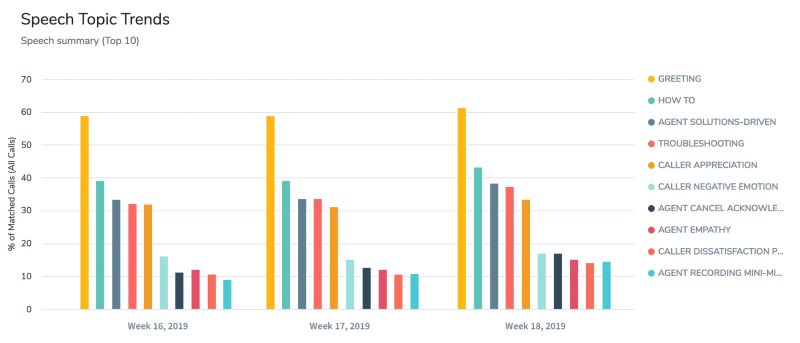
8×8’s speech trending report determines the number of calls that match a given topic. (Source: 8×8)
8×8 offers speech analytics, an AI analytics tool that uses interactive graphics to classify interactions and review trending topics. Speech analytics also checks how agents are handling the calls and if they’re adhering to standard processes. This allows supervisors to pinpoint issues immediately and recommend ways to deal with the customer issue more efficiently.
Top AI VoIP Providers
The emergence of various VoIP providers has made the VoIP industry extremely competitive.
Major players are leveraging AI to gain a competitive edge over their competitors and optimize the quality of their services. If you’re in the market for an AI VoIP system, we listed the top five market-leading solutions with feature-rich, AI-powered capabilities below.
AI VoIP Providers | Monthly Starting Price (per User) | Key AI VoIP Features | Learn More |
|---|---|---|---|
 | $23 |
| |
 | $30 |
| |
 | $30.95 |
| |
 | Custom pricing |
| |
 | $10 |
| |
Benefits of AI VoIP for Business
Integrating AI and VoIP has unlocked a wealth of opportunities for businesses wanting to improve their operational efficiency, customer service, and call management. To better understand what is AI VoIP, we break down its potential benefits to your company’s bottom line.
- Round-the-clock customer self-service: More customers expect businesses to be available 24/7 to meet their convenience needs. Self-service tools like IVR and chatbots are always available to meet customers on their preferred channels and provide general assistance, such as transaction processing and account management.
- Personalized customer experience: Customers want businesses to recognize their unique needs and preferences. With AI analytics, you can collect valuable customer information and use it to learn from their behavioral patterns. For example, predictive analytics can provide product recommendations to customers based on their historical interactions with an ad or service.
- Fewer agent workloads: Virtual assistants are designed to handle a large volume of low-level customer inquiries to free up time for agents so they can use it on more complex tasks requiring human touch. They can be programmed to schedule conference calls, provide answers to frequently asked questions, and collect customer feedback.
- Streamlined call management: Intelligent call routing systems automate a variety of customer support processes, from routing calls to the right destination to providing information to callers. This eliminates the need to wait for an available agent and increases first-contact resolution rates.
Frequently Asked Questions (FAQs)
Conversational AI is a set of AI technologies that allow computers to understand human language and carry out meaningful human interactions. Chatbots and voice assistants are some of the popular forms. They can be used to provide online customer support, streamline work processes, and optimize call center operations.
The use of VoIP AI raises a few privacy and ethical challenges that users must address responsibly. These involve deploying solid security measures, anonymizing customer data, and adhering to industry regulations.
A current development in AI VoIP is the emergence of generative AI, a new AI trend that produces content based on input data. VoIP providers like RingCentral and Dialpad have joined the trend by bringing features that generate post-call summaries and create appropriate customer responses.
Bottom Line
AI in VoIP involves the use of machine learning capabilities in cloud-based phone systems to enhance efficiency and customer experience. The integration of these technologies has enabled companies to provide personalized customer service through features such as chatbots, advanced analytics, and IVR. If you’re ready to revolutionize your communication strategy, make sure to take advantage of AI-powered features in VoIP phone systems.